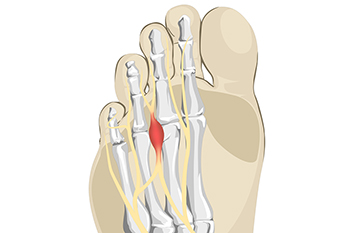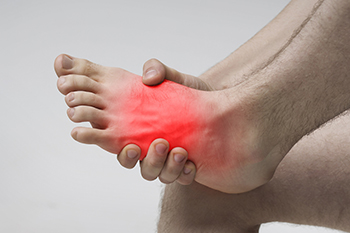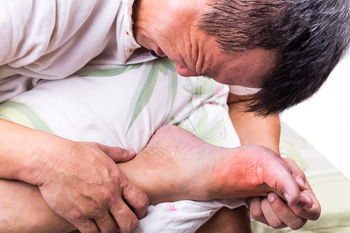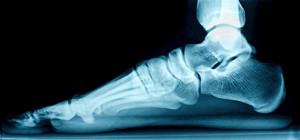
(908) 381-8160Berkeley Heights

Research has indicated that the foot condition known as Morton’s neuroma is generally simple to diagnose. The common symptoms that many people experience with this ailment can include a tingling sensation between the second and third toes, or the fourth and fifth toes. It may begin after wearing specific types of shoes, or from walking or standing for an extended period of time. Many people can develop this condition from wearing high heels. This can be a result of a lack of adequate space for the toes to move freely in. A clicking feeling and sound may be felt in the ball of the foot, and it can feel uncomfortable. Many people often equate this feeling with the sensation of stepping on a marble, or having an out of place seam from a sock. Additionally, the toes can separate with a large Morton’s neuroma, and medical attention is needed. The toes may become numb, and it can be quite painful to walk. If you have any of these symptoms, it is advised that you place yourself under the care of a podiatrist who can use various conservative methods, or possibly even perform surgery, to treat Morton’s neuroma.
Morton’s neuroma is a very uncomfortable condition to live with. If you think you have Morton’s neuroma, contact Dr. Janet Leicht of New Jersey. Our doctor will attend to all of your foot care needs and answer any of your related questions.
Morton’s Neuroma
Morton's neuroma is a painful foot condition that commonly affects the areas between the second and third or third and fourth toe, although other areas of the foot are also susceptible. Morton’s neuroma is caused by an inflamed nerve in the foot that is being squeezed and aggravated by surrounding bones.
What Increases the Chances of Having Morton’s Neuroma?
Morton’s neuroma is a very treatable condition. Orthotics and shoe inserts can often be used to alleviate the pain on the forefront of the feet. In more severe cases, corticosteroids can also be prescribed. In order to figure out the best treatment for your neuroma, it’s recommended to seek the care of a podiatrist who can diagnose your condition and provide different treatment options.
If you have any questions, please feel free to contact our office located in Berkeley Heights, NJ . We offer the newest diagnostic and treatment technologies for all your foot care needs.

It is believed that 75 percent of people will at some point experience foot pain. This should not come as a surprise, since we are on our feet numerous times daily for nearly our entire lives. The main cause of most foot pain starts with wearing shoes that do not fit properly, are tied too tightly, have heels that are too high, or squeeze the toes. Even exercising in shoes not appropriate for the activity can cause pain in your feet as well as legs, hips, and back. Long term effects include bunions, blisters, corns, and calluses. The next likely cause of foot pain is the way you walk. Rolling your feet inward or outward when you walk can be the cause of other problems, such as flat feet, arch pain, and heel pain. Certain medical conditions, such as gout and arthritis can cause painful inflammation of the bones, ligaments, and tendons of the feet. And since the feet have 26 bones, 33 joints, and more than 100 ligaments, this can be a problem. Finally, running on hard surfaces for long periods of time can cause stress fractures and other foot injuries. A podiatrist is an expert on dealing with the many causes and treatment of foot pain. Whether your pain is immediate or ongoing, it is a good idea to consult with a podiatrist.
Foot Pain
Foot pain can be extremely painful and debilitating. If you have a foot pain, consult with Dr. Janet Leicht from New Jersey. Our doctor will assess your condition and provide you with quality foot and ankle treatment.
Causes
Foot pain is a very broad condition that could be caused by one or more ailments. The most common include:
Diagnosis
To figure out the cause of foot pain, podiatrists utilize several different methods. This can range from simple visual inspections and sensation tests to X-rays and MRI scans. Prior medical history, family medical history, and any recent physical traumatic events will all be taken into consideration for a proper diagnosis.
Treatment
Treatment depends upon the cause of the foot pain. Whether it is resting, staying off the foot, or having surgery; podiatrists have a number of treatment options available for foot pain.
If you have any questions, please feel free to contact our office located in Berkeley Heights, NJ . We offer the newest diagnostic and treatment technologies for all your foot care needs.

Do you have pain in your big toe? Is your big toe swollen? Did these symptoms occur after being sick or becoming injured? If you answered yes to any of these questions, you may be afflicted with a condition known as gout. Gout is an inflammatory type of arthritis caused by a buildup of uric acid in the blood. Uric acid is naturally produced in the body to help you break down foods that contain purines. Once the purines are broken down, they are cleansed from the body through urine. If something interferes with this process, the buildup of uric acid can turn into urate crystals that collect around soft tissues and joints like the big toe. This can result in inflammation or gout. Men are said to be more susceptible to gout, as are those who eat foods rich in purines. Genetics, health problems like diabetes or high cholesterol, being obese, those who drink alcohol, and those who take diuretics may have an increased risk of developing gout. The pain from gout can be so severe it can interfere with walking and other daily activities. If you think you have gout, make an appointment to see a podiatrist for an accurate diagnosis and a treatment plan.
Gout is a painful condition that can be treated. If you are seeking treatment, contact Dr. Janet Leicht from New Jersey. Our doctor will treat your foot and ankle needs.
What Is Gout?
Gout is a form of arthritis that is characterized by sudden, severe attacks of pain, redness, and tenderness in the joints. The condition usually affects the joint at the base of the big toe. A gout attack can occur at any random time, such as the middle of the night while you are asleep.
Symptoms
Risk Factors
Prior to visiting your podiatrist to receive treatment for gout, there are a few things you should do beforehand. If you have gout you should write down your symptoms--including when they started and how often you experience them, important medical information you may have, and any questions you may have. Writing down these three things will help your podiatrist in assessing your specific situation so that he or she may provide the best route of treatment for you.
If you have any questions, please feel free to contact our office located in Berkeley Heights, NJ . We offer the newest diagnostic and treatment technologies for all your foot care needs.

The foot condition that is known as flat feet is apparent as the patient stands up and the entire foot lies on the floor. The medical term for this ailment is referred to as rigid pes planus, and may cause discomfort. Most babies are born with flexible flat feet, and the arch will fully develop by approximately seven years of age. Adults that have flat feet may have inherited loose ligaments, and may have extreme flexibility throughout their body. Rigid flat foot can be the result of a problem that affects the foot structure. The reasons for this can include congenital vertical talus, in which the bones in the foot are aligned improperly. This is considered to be a rare condition the patient is born with. Tarsal coalition exists when two or more of the foot bones are fused together, and often affects the flexibility of the entire foot. The condition that is known as lateral subtalar dislocation can affect people who have a normal arch, and the bone within the arch becomes dislocated. If you have flat feet for any reason, it is strongly suggested that you are under the care of a podiatrist who can accurately treat this condition.
Flatfoot is a condition many people suffer from. If you have flat feet, contact Dr. Janet Leicht from New Jersey. Our doctor will treat your foot and ankle needs.
What Are Flat Feet?
Flatfoot is a condition in which the arch of the foot is depressed and the sole of the foot is almost completely in contact with the ground. About 20-30% of the population generally has flat feet because their arches never formed during growth.
Conditions & Problems:
Having flat feet makes it difficult to run or walk because of the stress placed on the ankles.
Alignment – The general alignment of your legs can be disrupted, because the ankles move inward which can cause major discomfort.
Knees – If you have complications with your knees, flat feet can be a contributor to arthritis in that area.
Symptoms
Treatment
If you are experiencing pain and stress on the foot you may weaken the posterior tibial tendon, which runs around the inside of the ankle.
If you have any questions please feel free to contact our office located in Berkeley Heights, NJ . We offer the newest diagnostic and treatment technologies for all your foot and ankle needs.